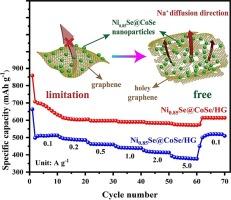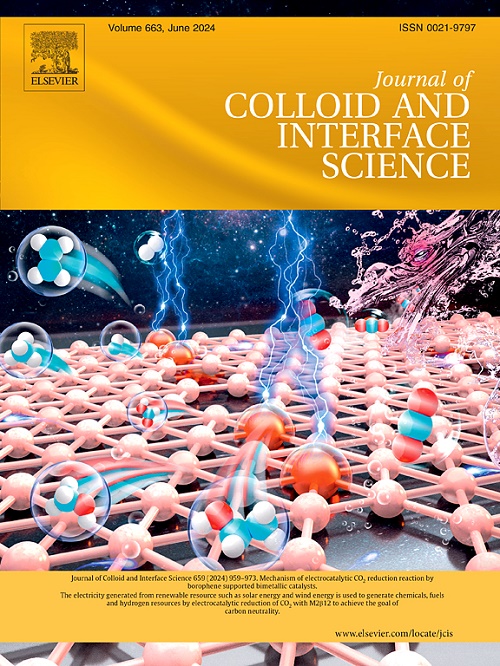Heterojunction-structured Ni0.85Se/CoSe nanoparticles anchored on holey graphene for performance-enhanced sodium-ion batteries
IF 9.7
1区 化学
Q1 CHEMISTRY, PHYSICAL
引用次数: 0
Abstract
Graphene-based metal selenides, are increasingly recognized for their potential in sodium-ion battery applications due to their superior electrochemical properties. The unique structure of graphene facilitates rapid in-plane transport of sodium ions, but the interlayer diffusion remains a significant challenge. The Ni0.85Se@CoSe heterojunctions, strategically grown adjacent to the graphene pores, offer a novel solution by creating in-plane holes that serve as direct channels for vertical ion transport, thereby enhancing cross-layer sodium ion permeation. The incorporation of Ni0.85Se@CoSe heterojunctions with holey graphene (NCS/HG) significantly enhances the reaction dynamics between sodium ions and anode material. These heterojunctions not only promote easier sodium ion insertion/extraction process by reducing the Na+ adsorption energy, but also improve the electrical conductivity by adjusting the band gap. The configuration supports high current density applications (573.5 mAh/g at 5.0 A/g), and ensures robust cycle stability with a capacity retention rate of 97 % after 1000 cycles at 2.0 A/g. Therefore, the development and etching techniques employed in engineering the Ni0.85Se@CoSe/HG graphene-based anodes exemplify a significant advancement in anode material design, highlighting the importance of material architecture in the development of high-performance energy storage devices.

锚定在孔状石墨烯上的异质结结构 Ni0.85Se/CoSe 纳米粒子用于性能增强型钠离子电池。
石墨烯基金属硒化物因其卓越的电化学特性,在钠离子电池应用中的潜力日益得到认可。石墨烯的独特结构有利于钠离子在平面内的快速传输,但层间扩散仍是一个重大挑战。在石墨烯孔隙附近战略性生长的 Ni0.85Se@CoSe 异质结提供了一种新颖的解决方案,它能产生平面内孔,作为离子垂直传输的直接通道,从而增强钠离子的跨层渗透。Ni0.85Se@CoSe异质结与孔状石墨烯(NCS/HG)的结合大大增强了钠离子与阳极材料之间的反应动力学。这些异质结不仅通过降低 Na+ 吸附能来简化钠离子的插入/萃取过程,还通过调整带隙来提高导电性。这种配置支持高电流密度应用(5.0 A/g 时为 573.5 mAh/g),并确保了强大的循环稳定性,在 2.0 A/g 下循环 1000 次后容量保持率为 97%。因此,Ni0.85Se@CoSe/HG 石墨烯基阳极工程中采用的开发和蚀刻技术体现了阳极材料设计的重大进步,突出了材料结构在开发高性能储能设备中的重要性。
本文章由计算机程序翻译,如有差异,请以英文原文为准。
求助全文
约1分钟内获得全文
求助全文
来源期刊
CiteScore
16.10
自引率
7.10%
发文量
2568
审稿时长
2 months
期刊介绍:
The Journal of Colloid and Interface Science publishes original research findings on the fundamental principles of colloid and interface science, as well as innovative applications in various fields. The criteria for publication include impact, quality, novelty, and originality.
Emphasis:
The journal emphasizes fundamental scientific innovation within the following categories:
A.Colloidal Materials and Nanomaterials
B.Soft Colloidal and Self-Assembly Systems
C.Adsorption, Catalysis, and Electrochemistry
D.Interfacial Processes, Capillarity, and Wetting
E.Biomaterials and Nanomedicine
F.Energy Conversion and Storage, and Environmental Technologies

 求助内容:
求助内容: 应助结果提醒方式:
应助结果提醒方式:


